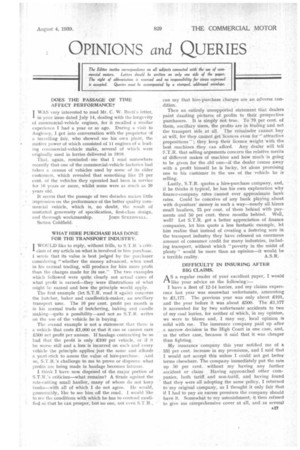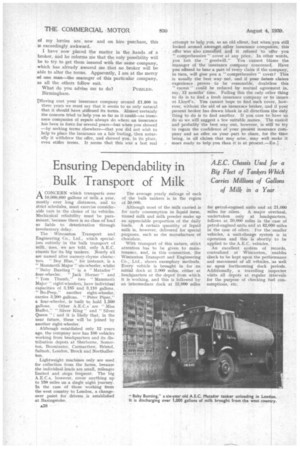OPINIONS and QUERIES The Editor invites correspondence on all subjects
Page 29

Page 30

If you've noticed an error in this article please click here to report it so we can fix it.
connected with the use of COM. mereial motors. Letters should be written on only one side of the paper. The right of abbreviation is reserved and no responsibility for views expressed. is accepted. Queries must be accompanied by 4 stamped. addressed envelope.
DOES THE PASSAGE OF TIME AFFECT PERFORMANCE?
I WAS very interested to read Mr. C. W. Brett's letter, 1 in your issue dated July 14, dealing with the longevity of commercial-vehicle. engines, for it recalled a similar experience I had a year or so. ago. During a visit to Anglesey, I got into conversation with the proprietor of a travelling fair, who showed me his own plant, the motive power of which consisted of II engines of a leading commercial-vehicle make, several of which were originally used in lorries delivered in 1919.
That, again, reminded me that I read somewhere recently that one of the commercial-vehicle factories had taken a census of vehicles used by some of its older customers, which revealed that something like 25 per cent, of the vehicles they operated had been in service for 10 years or more, whilst some were as much as 20 years old.
It seems that the passage of two deeades makes little impression on the performance of the better-quality commercial vehicle, which is, no doubt, the result of unstinted generosity of specification, first-class design,
and thorough workmanship. JOHN SPEEDWELL. Sutton Goldfield.
WHAT HIRE PURCHASE HAS DONE FOR THE TRANSPORT INDUSTRY.
I WOULD like to reply, without frills, to S.T.R. 's criti
cism of my article on what is involved in hire purchase. 1 wrote that its value is best judged by the purchaser considering ." whether the money advanced, when used in his normal trading, will produce for him more profit than the charges made for its use." The two examples which followed were quite clearly not actual cases of what profit is earned—they Were illustrations of what might be earned and how the principle would apply.
The first example (let S.T.R. read it again) concerns the butcher, baker and candlestick-maker, an ancillary transport user. The 10 per cent, profit per month is in his normal trade of butchering, baking and candle making—quite a possibility—and not as S.T.R. writes on the use of the vehicle he is buying.
The second example is not a. statement that there is a vehicle that costs £1,000 or that it can or cannot earn £500 net profit per annum. If haulage contracting be so bad that -the profit is only £100 per vehicle, or if it be worse still and a loss is incurred on each and every vehicle the principle applies just the same and affords a yard-stick to assess the value of hire-purchase. And so, s.T.R.'s challenge to me to prove or disprove what profits are being made in haulage becomes fatuous.
I think I have now. disposed of the major portion of S.T.R.'s criticism—what remains? A tirade against the rate-cutting small haulier, many of whom do not keep books—with all of which I do not agree. He would, presumably, like to see him off the road. I would like to see the conditions with which he has to contend modified so that he can prosper, but-no one, not even S.T.R., can say that hire-purchase charges are an adverse condition.
Then an entirely unsupported statement that dealers paint dazzling pictures of profits to their prospective purchasers. It is simply not true. To 70 per cent, of them, ancillary Users, the profits are in trading and not the transport side at all. The remainder cannot buy at will for they c,a.nnot get licences even for "attractive propositions "; they keep their licence weight with the best machines they can afford. Any dealer will tell F.T.R. that selling arguments concern the relative merits of different makes of machine and how much is going to be given for the old one—if the dealer comes away with a profit himself he is lucky, let alone promising one to his customer in the use of the vehicle he is selling.
Lastly, S.T.R. quotes a hire-purchase company, and, if he thinks it typical, he has his own explanation why finance-company rates cannot ever approximate bank rates. Could he conceive of any bank playing about with depositors' money in such a way—nearly all hirers small hauliers, 75 per cent, of them behind with payments and 50 per cent. three months behind. Well, well! Let S.T.R. get a better appreciation of finance companies, let him quote a less fantastic example, let him realize that instead of creating a festering sore in the transport industry they have released an enormous amount of consumer credit for many industries, including transport, without which "poverty in the midst of plenty " would be more than an opinion—it would be a terrible reality. A.S.R.
DIFFICULTY IN INSURING AFTER BIG CLAIMS.
AS a regular reader of your excellent paper, I would like your advice on the following:— I have a fleet of 12-14 lorries, and my claims experience last year was somewhat unfortunate, amounting to £1,177. The previous year was only about £101, and the year before it was about £500. The £1,177 Is accounted for by two unfortunate accidents to two of my coal lorries, for neither of which, in my opinion, we were to blame and, I may say, local opinion is solid with me. The insurance company paid up after a narrow decision in the High Court in one case, and, in the other case, because it said that it was cheaper than fighting.
My insurance company this year notified me of a 33b per cent, increase in my premiums, and I said that I would not accept this unless I could not get better terms elsewhere. The company immediately put the rate up 50 per cent.. without my having any further accident or claim Having approhached other companies, both tariff, and non-tariff, and having found that they were all adopting the same policy, I returned to my original company, as I thought it only fair that if I had to pay an excess premium the company should have it. Somewhat to my astonishment, it then refused to give me comprehensive cover at all, and. as several
of my lorries are new and on hire purchase, this is exceedingly awkward.
I have now placed the matter in the hands of a broker, and he informs me that the only possibility will be to try to get them insured with the same company, which has already assured me that no broker will be able to alter the terms. Apparently, I am at the mercy of one man—the manager of this particular company, as all the others follow suit.
What do you advise me to do? PUZZLED. Birmingham.
[Having cost your insurance company around 41,800 in three years we must say that it seems to us only natural that it should have stiffened its terms. Almost certainly the concern tried to help you so far as it could—as insurance companies of repute always do where an insurance has been in farce for several years—but when you showed —by seeking terms elsewhere—that you did not wish to help to place the insurance on a fair footing, then naturally it withdrew the offer, and showed you, in its place, even stiffer terms. It seems that this was a last real
attempt to help you, as an old client, but when you still looked around amongst other insurance companies, this offer was also cancelled and it refused 'to offer you " comprehensive" cover at any price. In other words, you lost the " goodwill." You cannot blame the maeager of the insurance company concerned. Have you offered to bear a part of every claim if the company, in turn, will give you a "comprehensive " cover? This is usually the best way out, and if your future claims experience proves to be reasonable, doubtless this "
excess" could be reduced by mutual agreement in, say, 12 months' time. Failing this the only other thing to do is to find a fresh insurance company or to insure at Lloyd's. You cannot hope to find such cover, however, without the aid of an insurance broker, and if your present broker has drawn blank in all directions the only thing to do is to find another. If you care to have us do so we will suggest a few suitable names. The easleA and probably the best way out, however, is still to try to regain the confidence of your present insurance company and an offer on your part to share, for the time being, in all claims that may arise, may well make it more ready to help you than it is at present. —ED.]




































































